Video
youtube
[Interview] Actor Kwon Hae Hyo, “I am a Feminist”
In this interview, Korean actor Kwon Hae Hyo discusses about feminism, his years of contributing towards causes relating to women’s rights and also his acknowledgement that there is a difficulty in understanding what Korean women in South Korea experience throughout their lives.
(Note: I am not highly fluent in the Korean language but I understood about 40-50% of what he was saying, and also with the help of the images.)
1 note
·
View note
Text
Reasons why one should be sceptical about BTS as goodwill ambassador for speaking against violence.
It is one thing to enjoy some of their music and another to see everything for what it truly is. To attack someone for having a negative opinion about BTS goes against the grain of an anti-violence campaign.
0 notes
Text
Insignifcance of a ladybug

Image courtesy of Dramabeans
This is a series that draws its audience in and leaves a deep and lasting impression. It implores its audience to contemplate layers upon layers of question about growing up, adulthood, and care (or the lack thereof in our society today). It is not romance and its story of love and care is one that is worthy of contemplation, one that should be sown into the hearts and minds of many.
In this scene - looking back at this months later since I first saw the series - we see the entire staff react dramatically to the tiny ladybug. And then there is Park Dong Hoon attempting to save the bug by carefully capturing it in order to let it free. Lee Ji An swats it with a folder and brushes it off her sleeve. She was unaffected by the commotion in the room and neither was she concerned about the bug. To her, the bug was insignificant. It is very much a metaphor of herself as a person in this engineering department/company that staffed employees who are university graduates and engineers while she is just a temp staff who does menial tasks, often going unnoticed by her colleagues.
The foreshadowing also shows how the rest of staff found her repulsive and disliked her presence as represented in the ladybug that disrupted one of the staff and eventually the entire department. Park Dong Hoon, on the other hand, is one who went out of his way to show some care towards a living entity that seemed insignificant, even repulsive to some. Park Dong Hoon embodies the empathy and care that the society at large is in serious lack of. Also noteworthy is the teaching of Buddhism in avoiding killing or trampling over any little animal will be relevant as the series develops, as seen in his friend who went off to become a monk eventually.
To a society that is increasingly measuring the worthiness and value of people by their educational merit or work merit, etc., this show inverses such expectations by presenting to its audience a character that is devoid of all those things of which society determines our value. Just because Park Dong Hoon recognises in her some value - just as he did in a ladybug - that is immeasurable according to societal standards. Similarly in the side characters such as Park Dong Hoon’s brothers and a failed actress, the struggle of individuals to find their own values become gravely obstructed by the society’s standard (singular because our society is often inclined to set one standard and one system for everyone). It is a great show and one I would like to watch once more if I had the time.
0 notes
Photo




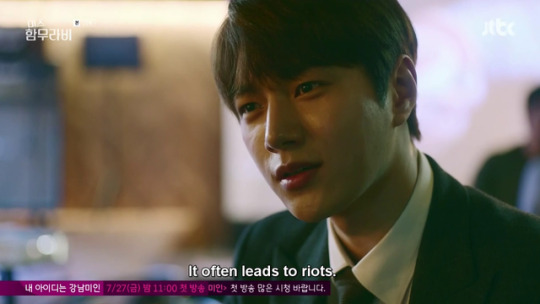

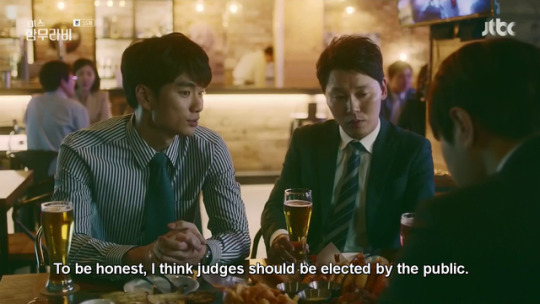






#democracy#genocide#how much do we know#genocide and the Holocaust are events that happened through narratives that encouraged and normalised violence amongst the masses#it isn't necessarily the public that voted tyranny and violence into power but that at that moment#violence and power intersected#leading to mass violence
2K notes
·
View notes
Photo
That’s the thing about democracy... Do we really know what democracy is? Or what it looks like... what it’s supposed to look like? Do we know if it’s a really good thing or only that the world has been telling you it’s good? Are the democracies we live in truly democracies?

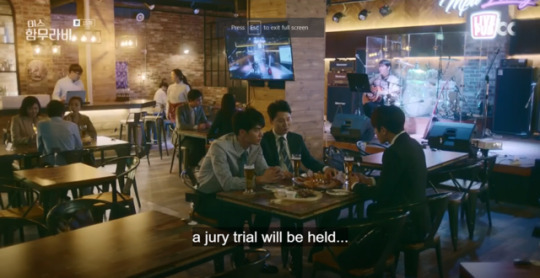

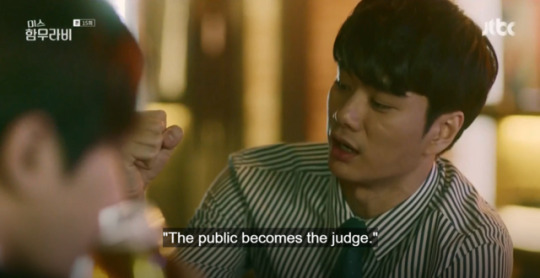

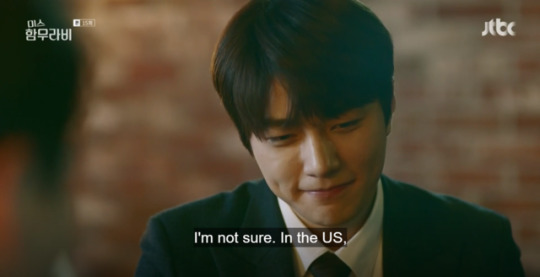

“It often leads to riots.”
542 notes
·
View notes
Text
The GSD (Get Shit Done) playlist: https://www.youtube.com/playlist?list=PL2zod1jm8v-bCdR2TJ26-Un3fA3_Ms3Ed
A playlist I've compiled because years ago, someone made a tracklist similar to this but it has since disappeared
This is a Kpop GSD playlist
5 notes
·
View notes
Link
Despite the very precarious position of the term ‘feminism’ in South Korean society today, this signals a small shift towards improvement in a predominantly patriarchal society. It is noteworthy that it took 16 years for the industry to recognise and acknowledge the works of female entertainers/comediennes in their industry.
It should not be conveniently forgotten that Lee Young-ja often plays into the stereotypes placed on her, especially in ‘Hello Counselor’. Due to her tall and well-built stature, she is often designed as a caricature of the scary and angry woman who lashes out at guests who are the subject of the “concern” for the episode. Without going into lengths regarding the format of the show, these individuals are often a cause for concern of the person who writes a letter to the show expressing their frustration/concern over a person’s habit or actions. Nevertheless, this should not overshadow the fact that she is able to show her truer personality and characteristics on other TV shows. She is also often known -- even amongst idols -- for her deep love for food.
This is a great start and is paving a path for many other female comediennes who are up and coming stars in the entertainment industry.
(And, I also believe that in the effort to dispel misunderstandings of feminism, the movement is not built on man-hating. Rather, it asks whether we can look at how women are being perceived and treated in society and any specific industry; the example here being a historical moment, after 16 consecutive years of male awardees of the grand prize, a woman is finally being recognised for her work too. The point is not that women should now “take over” but that good things can and ought to be shared. Acknowledgement of a person’s work is based on merits.)
0 notes
Text
Love yourself: the mainstream discourse of self-worth and the feminist discourse
Before anything else, it is important to note that the feminist discourse (whether as a political movement, legal theory or in criminology) is supposedly viewed as a spectrum. That is, the branching out of discussions that carry with it the label should not necessarily and automatically be dismissed as un-feminist although the basis should always be grounded with the ability to question validity and accountability of certain statements made by feminists (e.g. Greer).
Here, the term mainstream is categorically referring to the media of Korean popular culture. However, this essay will also discuss new media content; that includes generated content distributed on online media platforms such as Youtube.
Despite the political nature of feminist discourse, the inherently problematic nature is found in its disability to represent every individual women in a holistic manner. The problem with political discourse is that its narrative is weaved by individuals who have personal values, beliefs and agendas that actively excludes other individuals or groups. In that process, individual characteristics are then narrated out of existence within the discourse. It follows that not all feminist discourse are able to cater every individual's needs. And not all feminist discourse accounts for all groups of individuals although the underlying principles are there awaiting to be discovered and expanded into frameworks that accommodate a more diverse group.
Gilligan's theory on the ethics of care has been one of the highly discussed concept within feminist scholarly discourse. The ethics of care ascribes to standards that are purportedly flexible and pragmatic, a contrast to the ethics of justice. The basic conception is that the former does not create a static form of standards to be adhered to while the latter is a strict and highly unchangeable one. Likewise, society has created a standard that leans towards an ethics of justice that is also a standard for our legal systems (one that would warrant a full-length discussion of its own). The societal standard that is the main focus here is that of self-worth and beauty. While it is one that permeates a woman's life at almost every stage of their lives, it is less influential on men. However, it also must be noted that in our era of "lookism", the standards of beauty (or physical appearance) applies to men just the same. And in that standard, the permission to have self-worth becomes fused to the societal standard of beauty. The beauty standard is built into the capacity of self-worth: the ability of engaging in self-love becomes one that is dictated by societal standards which creates categories which individuals must be able to fit into. Any failure to fit would result in societal backlash, directly attacking individuals who do not fit and is thus unworthy of love, or even self-love.
Just recently, YouTuber Bae Lina has decided to sue malicious commenters, signalling at the emotional distress she has suffered from reading comments about her appearance. One of the impressionable but also commonly seen insult: "if I were you, I'd rather die" echoes the voices of bullies in our real world and in the cyber world. It is the epitome of the thesis that self-worth is measured by the acceptability of one's physical appearance and any failure to pass the margin would result in ridicule that appears to many that warrants such personal attack; the ones that mostly result in emotional and psychological harm. A society that has long sustained such societal standards by which self-worth is measured upon continues to perpetuate a culture of bullying and harm. Such reality is also reflected in media content that are mainly generated for entertainment purposes but serve a greater purpose in steering the direction of discourse in South Korea (and given the accessibility of South Korean media content, it also has certain degree of effect on transnational discourse on such matters). By looking to new media content such as web dramas, we can see how the narrative has shifted and how the direction of discourse closely reflects the more apparent changes taking place in contemporary Korean society.
Content analysis of web-dramas: The Miracle (2016) vs. It’s ok to be a little sensitive (2018, by OnStyle)
The narration of of femininity in The Miracle began by defining femininity according to physical appearances, that fatness cannot be viewed as feminine according to the Korean societal standards. The male lead had also pushed the female lead to the floor and the rationalisation of such act was that such woman is undeserving of love. The web drama concluded with the unchanging narrative that a fat woman would not be deserving of love, although it did not prevent the female lead from finding her own identity and happiness. It was not a perfect ending but I suppose one can still find certain merits.
The OnStyle 2018 feminist web drama has diverted the narrative, along with the increasing discussions of #MeToo in South Korea. This can be understood within the power/dominance model of feminist theory (mainly pioneered by MacKinnon). Primarily, MacKinnon forwarded consciousness-raising as feminist theory (in its political sense). She models her feminist theory on the hierarchy of power, where male dominance creates the inequality that contributes to the sex inequality. It is the social power taking the form of male dominance that manifests gender (or sex) differences (whether actual or socially constructed) in the form of gender inequality.
MacKinnon’s dominance model has been criticised for tending towards essentialism and she has since acknowledged the intersectionality framework, thus necessarily recognising that the dominance model of viewing male dominance, viz. power of men over women, as a totalising one. This means that male dominance should not be viewed as totalising over every individual women in the exact same way, with a totality that is not qualified or substantially different to different individuals from different backgrounds.
The replication or waves of MeToo in different cultural settings and societies has shown the need for an intersectional framework that identifies and recognises the cultural and societal difference that is intricately tied to the way public narrative is weaved in reflecting society at any time.
Returning to the content created by OnStyle, perceivably generated as an effect of the MeToo movement, the narrative focuses on the discourse of feminism in South Korea, contextualised in the lives of Korean freshman on-campus. There are power relations at several levels with greater degree of complexity that might not be present in Western societies. The hierarchy of age and gender intersects in very complex ways in Korean society (and also, to a greater degree as compared to many other Asian societies). When the female lead, in the first episode, is cornered by a male senior, she finds herself unable to reject the unwanted advances of the senior; later, a married man who stalks her outside her workplace and she was verbally abused. The narrative behind the web-drama propels a female lead who eventually grows into an individual who confidently cultivates feminist values, as encouraged by her feminist friend. In a patriarchal society, she resorts to the protection of her male friends (ie. pretending to be her boyfriend in order to avoid unwanted advances); here, it clearly identifies the dominance of men over a woman in a society where such dominance is substantially different and also layered according to the social context in which the female lead finds herself in. The narrative recognises and acknowledges the ways in which men (reflecting the Trumpian ‘locker room talk’ or the normalisation of “grab ‘em by the pussy”) sexually harass her in many different ways. The action taken by her friend in retaliation was met with criticisms by the male seniors/classmates who uses the label ‘feminist’ as a derogatory term. The 12-episode web drama explores various issues that are very present and still continuously debated in Korean society today. The series, however, deals with concepts of self-worth and values differently by aligning itself with the current shift in mainstream discourse of South Korean society.
It is a clear shift in narrative from the 2016 web drama towards the one in the 2018 web drama: the question of self-worth has shifted alongside the feminist discourse reaching the shores of the Korean peninsula. The re-thinking of inequality and the ability to feel self-worth is discovered through a new media content, something which is accessible to many demographics of Korean society (and international audience). It allows the many individuals to reconsider the way they perceive the manifestation of power relations and how it positions them in society, and in relation to that, it makes these groups of individuals vulnerable to abuses. Such a shift in narrative allows young women to question the societal standards of beauty, as one example, and also how they are severely affected by the male standards of society. Feminist works of art - literary and film - face rejection and protest from groups of people who rationalise their detest against feminism as either misandry or creating gender conflict. This strand of logic bears striking resemblance to the refusal to discuss race in the US: this as a form of ‘political correctness’ that projects an image of post-racial American society. While it appears to be very different issues of society and also of political correctness, the problem that appears to be inherent in discussions of equality produces some form of “paranoia” which seeks to bar explicit discussions about race and gender; Professor Jackson’s thesis on racial paranoia and the unintended consequences of political correctness addresses the issues of such paranoia that is born of the pursuit for political correctness. Professor Jackson does not seek to discredit political correctness but he explains that political correctness that
Jackson’s view of urging people to consider the anxiety of white people and their reactionary fear towards “the browning of America” is akin to Prof. Richards’ concept of radical empathy in sociology. The ability to empathise with a group of people opens up ways to understanding (which is the essence of social science) that would be crucial to pushing a society towards betterment in terms of inclusivity. The idea of “sensitivity” can be twofold and in the current stage, it should be viewed as a means of pushing society towards a better version of itself.
The problem with the narration of femininity in The Miracle is that it created a standard of self-worth that was measured according to some generalised societal expectation of femininity. What it means to be a woman is effectively created, defined and shaped beyond the autonomy of the woman herself. While the female lead eventually determines her own self-worth by auditioning once again, it does not face the problematic implications of allowing commentary on her self-worth that is determined by the weighing scale rather than her talent. While the 2018 web drama deals with different issues, it does achieve a better effect in making obvious participation of even male characters who are clueless when it comes to feminism or how young women face very different forms of oppression than they do in a campus setting; eg. rather than being suppressed by seniority as a male in school or even workplace, women are doubly oppressed by both being a junior and a woman at the same time. Although, this does not imply that male counterparts face trivial oppression in such a social system. It does, however, identify and recognise the oppression that may have a double effect on certain groups of individuals.
To recognise that the term “love yourself” ought to carry more weight than some catchphrase urging people to appreciate themselves and be more comfortable in their own skin is to acknowledge that mainstream public discourse and media discourse share a very interactive relationship. Reflecting the MeToo/feminist discourse in new media content addresses the issues to different demographics in a new way. It also prompts us to rethink our perception of certain things. It does not necessarily have to be misandry or man-hating (as seen in active male participation of feminist discourse, whether actively or passively); it is fundamentally an issue of individual rights and in any discourse of rights, there is a need to question even our most ostensibly basic understanding of social structures. What may seem natural, inevitably or ‘just things being the way it is or should be’ ought to be scrutinised and re-evaluated. In any debate about rights, the aim is not to take fundamental rights away from another group but it does seek to change power dynamics, ie. it ultimately attempts to change power relations and balance. This may appear to be subversive to many and it does incite some form of panic in certain groups, especially those whose power are being corroded by any shift. And if we are to heed Prof. Jackson’s advice, we ought to also listen to the voices of both sides, that is also those whose power is being shifted away from them. The repulsion shown towards feminism appears to be the next question many would have to address. The fear of being identified as feminist may signal at this as well, and it is not confined to Korean or Asian society. This can be fostered by new media content such as that created by OnStyle, which has significantly high viewership for a web series.
References:
Korean #MeToo spurs jump in domestic violence reports
MIT Lecture Notes: Difference and Dominance
Sex, Lies and Justice: a conversation between Catharine MacKinnon and Ron Suskind
A Petition to Ban Movie ‘Kim Ji Young Born in 82′
Seoul's Doing Cafe creates community around feminism, still a taboo in South Korea
Racial Paranoia: The Unintended Consequences of Political Correctness
Web series: It’s ok to be a little sensitive (literal translation)
P.s. I do wish I had more time to polish this piece but I thought it would be better to have it up than to labour over it given that there are many other deadlines I am facing. Please do forgive the clumsiness in sentence structure or any mistakes I have made in this piece; and I would appreciate any comments or feedback on it too.
#love yourself#feminist discourse#feminism#South Korea#MeToo#MeToo in Korea#Catharine Mackinnon#sociology#gender#Carol Gilligan#hallyu studies#web drama#sociological analysis of web drama#empathy
0 notes